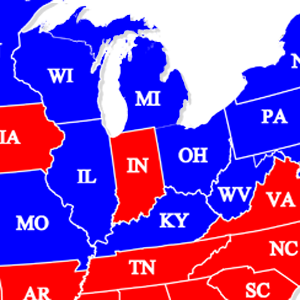Union Bosses Threaten Elected Officials -- Toe The Big Labor Line
Leo Gerard, the boss of the United Steelworkers Union, warned Democrats not to compromise at all on the fiscal cliff. Gerard said any Democrats who…
Leo Gerard, the boss of the United Steelworkers Union, warned Democrats not to compromise at all on the fiscal cliff. Gerard said any Democrats who…
Union bosses are wasting no time in trying to engineer their spoils from the president’s re-election victory. The Wall Street Journal reports when asked, Mr. Trumka said he also wants labor laws revamped … though he wouldn’t be more specific or…

[media-credit name=” ” align=”alignright” width=”150″][/media-credit]According to NewsMax, Terry Miller, director of the Center for International Trade and Economics at the Heritage Foundation knows why some states struggle while others are booming — Right To Work freedom: “He points out that the 23…

[media-credit name=” ” align=”alignright” width=”150″][/media-credit]According to NewsMax, Terry Miller, director of the Center for International Trade and Economics at the Heritage Foundation knows why some states struggle while others are booming — Right To Work freedom: “He points out that the 23…
Should President Obama be re-elected, his thank you note to the union bosses will come in the form of legislation, according to AFL-CIO boss Richard Trumka: AFL-CIO President…
Despite being a Right to Work state, Oklahoma still acts as a bagman for government labor unions, the state’s labor commissioner says and he is demanding reform. Oklahoma’s labor commissioner wants to free the state from collecting public union and…
Project Veritas has released a new video exposing evidence of a quid pro quo relationship between liberal Senator Robert Menendez and the Service Employees International Union (SEIU). “The purpose of this investigation is to demonstrate the clear conflict of interest that exists when an…

Shikha Dalmia of Reason looks at big labor's effort keep Michigan a second rate economic state through a series of referendums on the statewide ballot next month: We've seen Gov. Scott Walker's battle in Wisconsin and the Chicago Teachers Union strike next door. Now in Michigan comes another Midwestern political showdown that will carry enormous implications for the role of unions in American life. [media-credit name=" " align="alignright" width="300"][/media-credit]The Michigan Supreme Court recently approved the placement of a proposed constitutional amendment on the November ballot. If passed by voters, the so-called Protect Our Jobs amendment would give public-employee unions a potent new tool to challenge any laws—past, present or future—that limit their benefits or collective-bargaining powers. It would also bar Michigan from becoming a right-to-work state in which mandatory union dues are not a condition of employment. The budget implications are dire. Michigan public unions began pushing the initiative last year, shortly after Michigan Gov. Rick Snyder—facing a $2 billion fiscal hole—capped public spending on public-employee health benefits at 80% of total costs. This spring, national labor unions joined the amendment effort after failing to prevent Indiana from becoming a right-to-work state. Bob King of the United Auto Workers said that Michigan's initiative would "send a message" to other states tempted to follow Indiana's example. The UAW, along with allies in the AFL-CIO and the Teamsters, poured $8 million into gathering 554,000 signatures—some 200,000 more than needed—to put Protect Our Jobs on the Michigan ballot.
Jimmy Hoffa, the boss of the Teamsters union, is prone to exaggeration and scare tactics. His recent tirade about Mitt Romney is just the latest example. Hoffa said that Romney’s election would “annihilate” Big Labor. Of course, Hoffa…